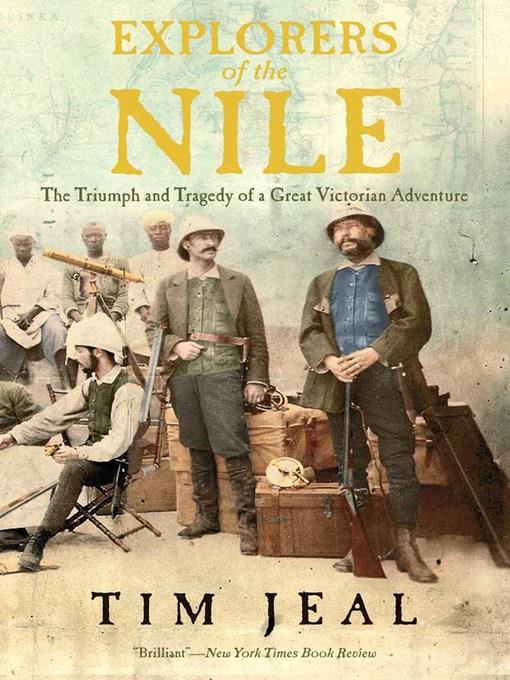
Explorers of the Nile
The Triumph and Tragedy of a Great Victorian Adventure
- اطلاعات
- نقد و بررسی
- دیدگاه کاربران
نقد و بررسی

September 1, 2011
An account of the hardships, backstabbing and fierce determination of a group of British adventurers who explored the headwaters of the Nile River.
Jeal, the author of a well-received biography of the explorer Henry Morton Stanley (Stanley: the Impossible Life of Africa's Greatest Explorer, 2007 etc.) and an earlier biography of David Livingstone, here seeks to rescue the reputation of an earlier member of the tribe, John Hanning Speke. In the mid 19th century, Speke discovered the source of the river, "the planet's most elusive secret." Speke was led by Richard Francis Burton, the British intelligence officer, travel writer and explorer most famous for his translation of The Arabian Nights. Jeal describes the friction that developed between the two men during their expedition, made worse by the travails of the journey, which included ulcers caused by parasites, malaria and, for Speke, a serious spear wound. After the two explorers discovered Lake Tanganyika, Burton was forced by illness to stop while Speke continued on to the southern shore of Lake Victoria, the actual source. Burton's efforts to discredit Speke's discovery included deliberate misrepresentation of water flows in the region, and it was Stanley who later confirmed the outflow from Lake Victoria to the Nile. Jeal offers rich descriptions of the African kingdoms in the region and the still-flourishing slave trade, and the larger-than life cast of characters includes Livingstone, Stanley and several lesser figures.
An enjoyable adventure story. For a broader scope, see Adam Hochschild's King Leopold's Ghost (1998).
(COPYRIGHT (2011) KIRKUS REVIEWS/NIELSEN BUSINESS MEDIA, INC. ALL RIGHTS RESERVED.)

October 1, 2011
Having authored biographies of individual explorers, e.g., Stanley: The Impossible Life of Africa's Greatest Explorer, Jeal now presents an overall account of the Victorian-era struggle to locate the true source of the Nile through the expeditions of Richard Burton, John Hanning Speke and James Augustus Grant, Samuel and Florence Baker, David Livingstone, and Henry Morton Stanley. These explorers faced disease, harsh terrain, and hostile tribes--and, in some cases, bitter rivalries and fierce public criticism. Jeal gives particular attention to the conflict between compatriots-turned-enemies Burton and Speke, and his subjectivity is evident as he attempts to exonerate Speke of several allegations that ruined his reputation. He also briefly examines the "Scramble for Africa" and the horrific effects of aggressive colonization on the continent and its peoples. VERDICT Jeal's sympathies, particularly toward Speke and Stanley, can overwhelm the text, but for the most part this is a thorough and gripping account of the trials these explorers faced both in Africa and at home. Recommended for readers who enjoy books on African exploration, e.g. Alan Moorehead's classics The White Nile and The Blue Nile, or those seeking a fresh viewpoint on some of the Victorian era's most famous adventurers.--Kathleen McCallister, Univ. of South Carolina Lib., Columbia
Copyright 2011 Library Journal, LLC Used with permission.

September 15, 2011
The eccentric Victorian explorer Richard Burton once confessed that discovery is mostly my mania. Over the course of the last half of the nineteenth century, a handful of larger-than-life characters that included Burton, David Livingstone, John Hanning Speke, and Henry Morton Stanley embodied this mania as they battled lethal diseases, invidious slave traders, and unreceptive indigenous tribes in their grand attempts to open the Dark Continent to Christianity, enlightenment, and eventual exploitation. Author of the acclaimed Stanley (2007), Jeal recounts each perilous expedition to unlock the secrets of the Nile watershed with an astonishing clarity and depth that brings to life the hazardous environs of equatorial Africa. In the course of his superb narrative, Jeal rescues the historically much maligned character of Speke, celebrates the humanitarian spirit of Livingstone, and astutely assesses the long-term consequences of the imperialist scramble for Africa that ensued in the wake of Victorian explorers, including the horrendous civil wars of Uganda, Kenya, and Sudan. Jeal's judicious account is a must-read for anyone hoping to understand the internal dynamics of modern state-building in central Africa.(Reprinted with permission of Booklist, copyright 2011, American Library Association.)




دیدگاه کاربران